Editor:
Brandon Sweet
University Communications
bulletin@uwaterloo.ca
Disrupted by war, students find welcome at Waterloo
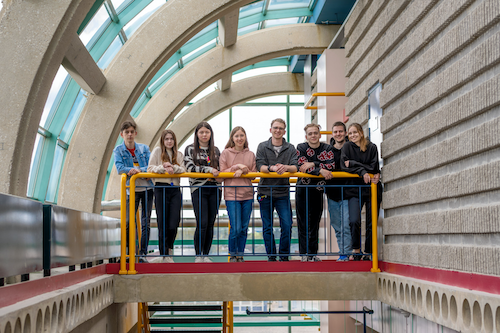
Stepan Boiko, Viktoriia Trostsinska, Oleksandra Kmet, Antonina Rudakova, Severyn Balaniuk, Vladyslav Yusiuk, Nazarii Kulyk and Karina Sukhina stand in the Davis Centre.
By Carol Truemner. This article was originally published on Waterloo News.
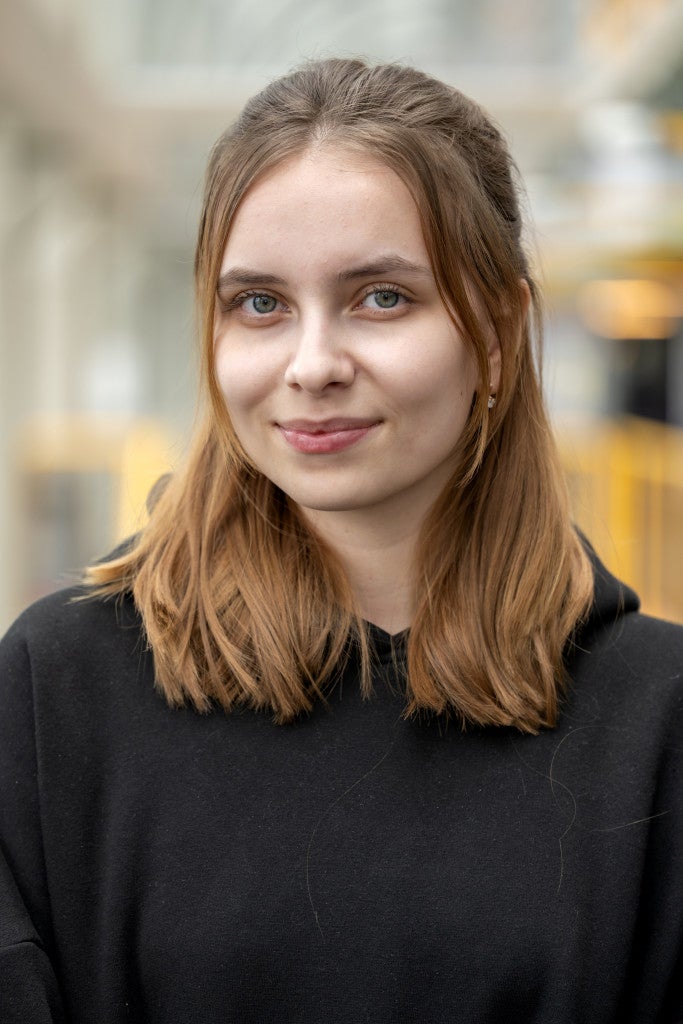
Karina Sukhina woke up to the sound of the first bomb that landed on Kyiv at five a.m. February 24.
While at first uncertain about what she’d heard, Sukhina and her boyfriend Nazarii Kulyk were soon packing their bags and heading for safety.
“It was an awful time,” she says. “I can’t stop thinking about the morning Kyiv was bombed. We were so stressed for the next couple of weeks.”
Days later, the master’s student in computer science at Taras Shevchenko National University of Kyiv and Kulyk, also a master’s student studying at National Pedagogical Dragomanov University, fled Ukraine for Poland.
A short time afterward, they both received offers to join the University of Waterloo’s Ukrainian Academic Internship program this spring. Delighted at the prospect of continuing their education that had been disrupted by war, they arrived on campus with six other Ukrainian students in mid-May.
Campus-wide effort
Supported by a cross-campus collaboration, Waterloo is welcoming a total of 34 Ukrainian students whose studies were interrupted by the ongoing war in their country.
Led by the Waterloo Artificial Intelligence Institute (Waterloo.AI), the internship will cover a variety of academic research, hands-on lab tours and workshops with a focus on artificial intelligence. Supplementary classes in English as a Second Language are being delivered by Renison University College.
Funded by numerous on-campus sponsors and external corporate supporters such as Manulife, BlackBerry, Bank of Montreal and Vector Institute for Artificial Intelligence, the internship, provided at no cost to the Ukrainian students, includes in-person academic activities, on-campus accommodation and meals at St. Paul’s University College, and travel costs.
Planning for the internship began after a couple of Waterloo Engineering professors contacted Mary Wells, dean of the Faculty of Engineering, about the possibility of offering a Ukrainian student program similar to one University of Toronto (U of T) had launched with the Vector Institute.
Building on the U of T and Vector Institute program, Waterloo introduced its initiative in mid-April. Dovetailing on U of T’s list of applicants to its program, Waterloo sent offers to 42 prospective students —approximately half men and women and half undergraduate and graduate students.
‘Unbelievable opportunity’
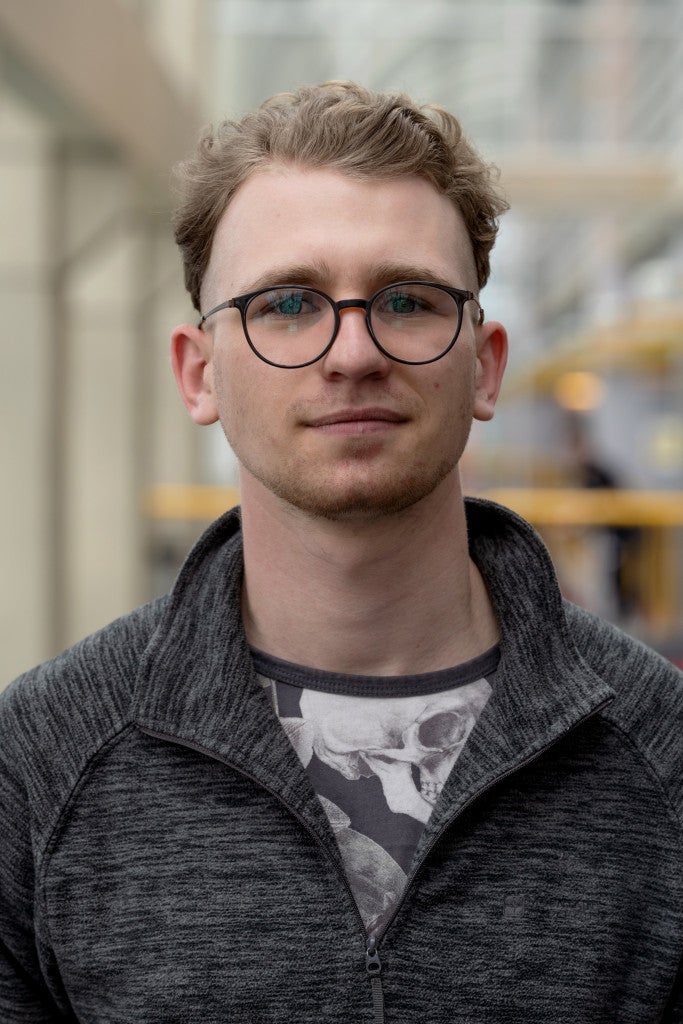
Waterloo’s internship offer came at just the right time for Severyn Balaniuk.
The fourth-year computer engineering student who had been attending National Ukrainian Technical University in Kyiv left Ukraine with his younger brother and mother days after Russia invaded his country.
They ended up in Smoky Lake, a small Alberta town with a strong Ukrainian community that is helping support Balaniuk’s family.
For years while living in Kyiv, Balaniuk watched YouTube videos featuring Waterloo’s Mike & Ophelia Lazaridis Quantum-Nano Centre and said it’s an “unbelievable opportunity” that has brought him to the University.
“I’ve researched a lot of quantum computing institutes in Canada and the United States and every time I looked Waterloo’s was the top result,” he says. “I had a tour of it the other day and found it amazing.”
Sukhina and Kulyk keep in touch daily with their families who are still in Ukraine.
“They’re OK for now,” she says. “Our hope is that the worst has happened in the country.”
While Sukhina is still finding her way around the University and meeting new people, she was quickly introduced to a regular and often unwelcome visitor to the campus — the Canada Goose.
“When we woke up the first morning, we were really surprised to hear them on the roof of our building,” she says. “But now we’re OK with them — we have local birds like that in Ukraine.”
The University has launched a fund to support students whose education has been impacted by war or conflict with the Ukrainian students as the immediate beneficiaries. Please consider donating to the Students At-Risk Fund.
Event will demonstrate how digital disinformation undermines democracy
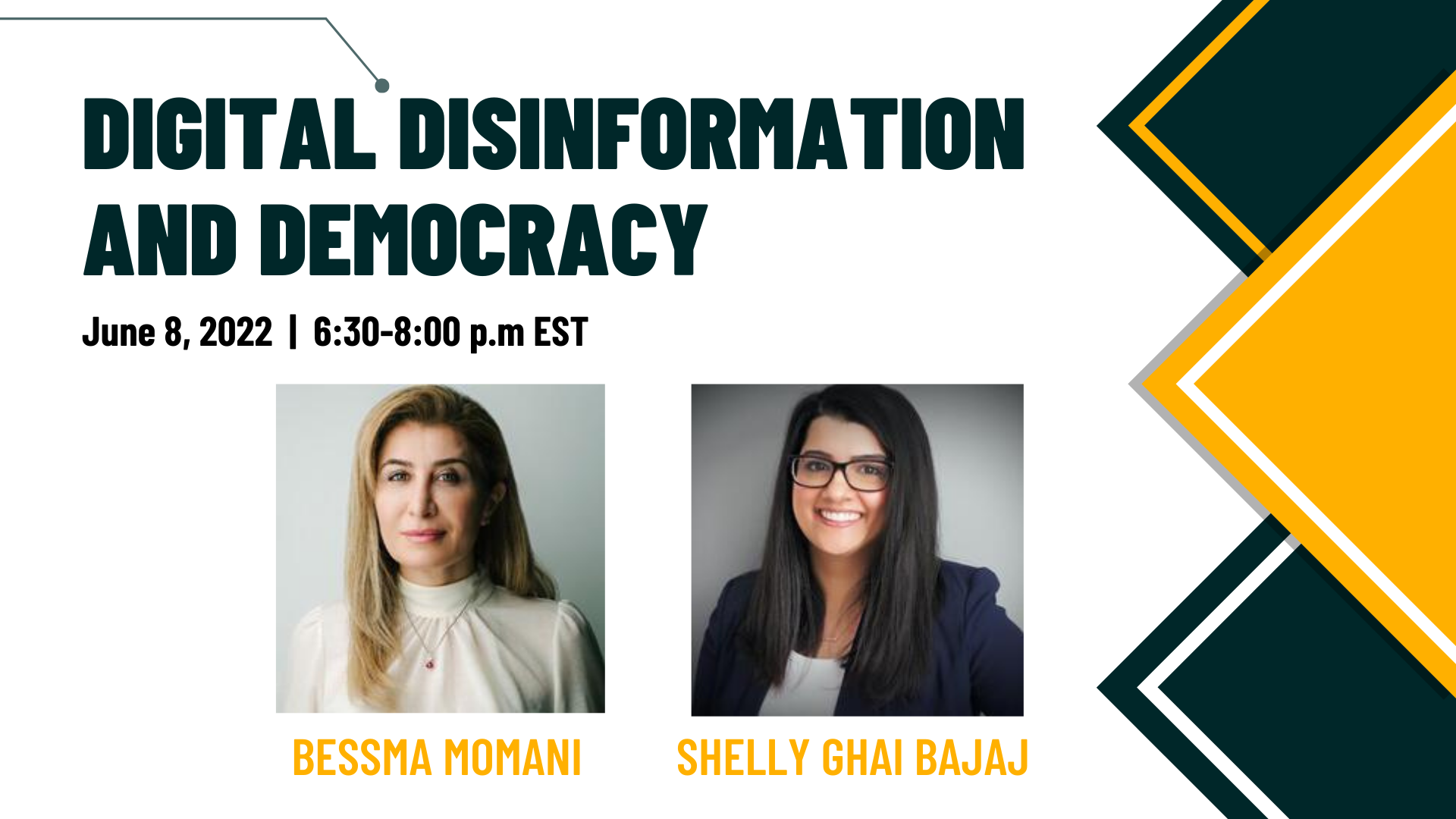
A message from the UWaterloo Cybersecurity and Privacy Institute.
Social media platforms have both positive and negative impacts on liberal societies. One prominent example is disinformation, which is the deliberate spread of false information to deceive people. It is inherently transnational, which disrupts our conventional understandings of borders and citizenship. Yet, it is difficult to monitor social media platforms while ensuring civil liberties are not infringed. Unfortunately, most research focuses on larger platforms such as Facebook and Twitter. In essence, digital disinformation continues to spread in less visible digital spaces, which ultimately undermines Canadian democracy.
To learn more, join UWaterloo Cybersecurity and Privacy Institute for their next event, CPI Talk: Digital Disinformation and Democracy. This Zoom webinar will be held on June 8 from 6:30 p.m. to 8:00 p.m. (EST).
Hosts Bessma Momani and Shelly Ghai Bajaj will discuss:
-
how disinformation flows and spreads on direct messaging and private chat applications.
-
why they are important digital spaces to study
-
the broader political and social implications of disinformation.
CPI Talks focuses on cybersecurity and privacy topics that concern the general public. Anyone can attend, even if they lack prior knowledge of the event’s topic. We invite people of all ages and affiliations, such as high school students and non-Waterloo staff, to join.
Dr. Bessma Momani is a Professor in the Department of Political Science, Interim Associate Vice-President of Interdisciplinary and Sponsored Research, and senior fellow at the Centre for International Governance Innovation, while Shelly Ghai Bajaj is a Postdoctoral Fellow working with Professor Momani on projects relating to democracy, disinformation, and identity politics and the digital sphere.
Copyright website to get a redesign
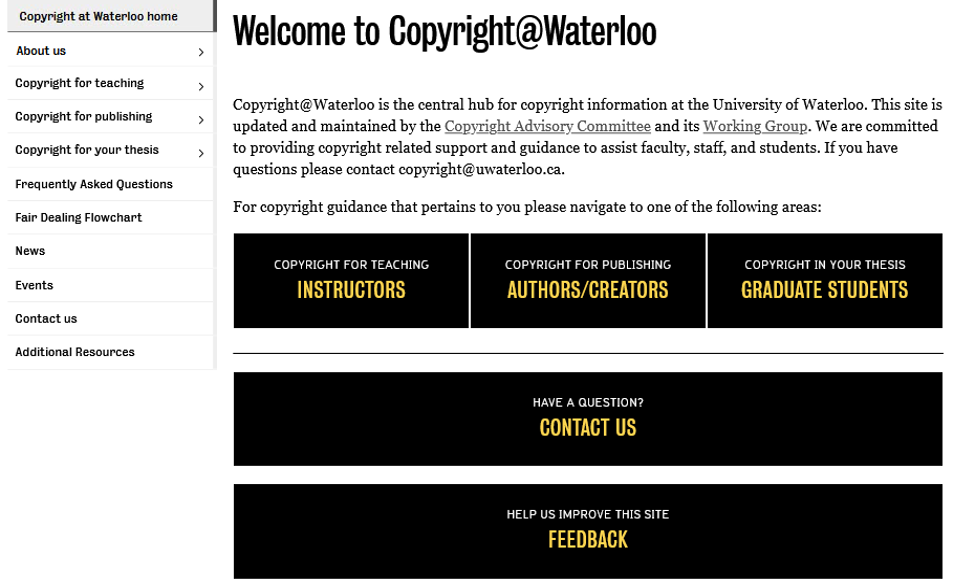
A message from the Copyright Advisory Committee.
On Monday, June 27, the Copyright@Waterloo website will be rearranged to improve ease of use. Content will be placed in three categories: teaching, publishing, and thesis. The Frequently Asked Questions (FAQ) will also be redesigned and tagged with categories for easier navigation. You can compare the old version to the new version.
Submit your feedback on the website feedback form or reach out to Lauren Byl, copyright & licensing librarian with your thoughts. For any copyright questions, email copyright@uwaterloo.ca.
MFA thesis exhibitions begin June 2
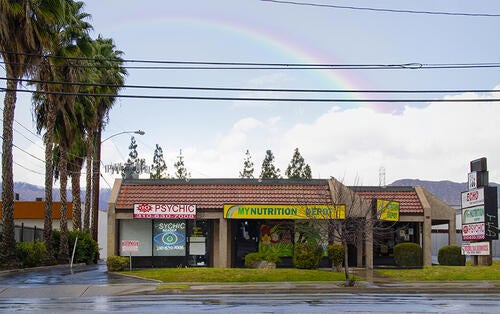
The Department of Fine Arts and the University of Waterloo Art Gallery will be showcasing the work of MFA candidate, Amber Lee Williams, and MFA alumni Brubey Hu, Tyler Matheson, B Wijshijer, and Kayla Witt, each of whom had their thesis exhibitions cancelled in 2020 during the first wave of the pandemic.
An opening reception is scheduled for Thursday, June 2 from 5:00 p.m. to 8:00 p.m. at UWAG on the University's East Campus. Visitors will be required to show proof of vaccination and comply with campus safety guidelines.
Amber Lee Williams is an interdisciplinary artist from the Niagara region. Family is at the center of her practice. Her research resides in and around the home: observing and photographing the daily lives of her children, as well as drawing inspiration from the possessions and photographs left behind by deceased loved ones. Bringing the past into the present, navigating the inevitable shifting of relationships, and thinking about how everyday objects can serve as prompts to remembering are important methodologies in her work. Amber not only explores the way in which we are remembered, but also all that is lost.
Brubey Hu works mostly in painting and artists’ books. Her creative interests include architecture, dualism, translation, feminism, memory, and colour theory. She recently exhibited as part of Dynamic Relations at Winchester Galleries, Victoria, BC; and Show.21at Cambridge Galleries, Cambridge, ON. She attended the Tao Hun Tan: 4th International Artist Retreat and Residency in China in 2019; and the BAiR Emerging Visual and Digital Arts Residencyrts in Alberta in 2018.
Tyler Matheson is a queer interdisciplinary artist, educator, and culture worker residing in the territory of the Mississaugas of the Credit. His work serves as an aesthetic and material investigation of the performativity of othered bodies, identities, and visibility. Recent exhibitions include that was then, this is now at Lonsdale Gallery, Toronto; Galerie du Nouvel-Ontario, Sudbury; Above the Belt, Below the Bush with Minor Hockey Curatorial, North Bay; and Minding the Archive, Hamilton Artists Inc. He is currently a resident artist at the Living Arts Centre in Mississauga.
B Wijshijer makes sneaky videos, performances, installations, digital images and props that interrogate computer-mediated intimacy via the societal constructions of online scams, tricks, and jokes. Interested in magic, love and transcendence within late capitalism, their work jests within the contrast of unity, bliss, and commodity. Selected exhibitions and screening include Open Windows, Art Museum at University of Toronto; MoveObjectOn, the plumb, Toronto; Mimema, Ed Video at Platforms Project NET 2021, Athens, Greece; Zoom Obscura, InSpace Gallery, Edinburgh, Scotland.
Kayla Witt explores contemporary anxieties surrounding both domestic and urban spaces in paintings, installations, and videos. Her recent photography examines the nefarious side of commodified wellness and the revolving door of psychic healers observed in her new home of Los Angeles. She has exhibited at Critical Distance Centre for Curators, Toronto, ON; Bunker 2 Contemporary Art Container, Toronto, ON; and has been an artist-in-residence at Struts Gallery and Faucet Media Arts Centre in Sackville, NB; and the Otis College of Art and Design in Los Angeles, CA.
Tuesday's notes
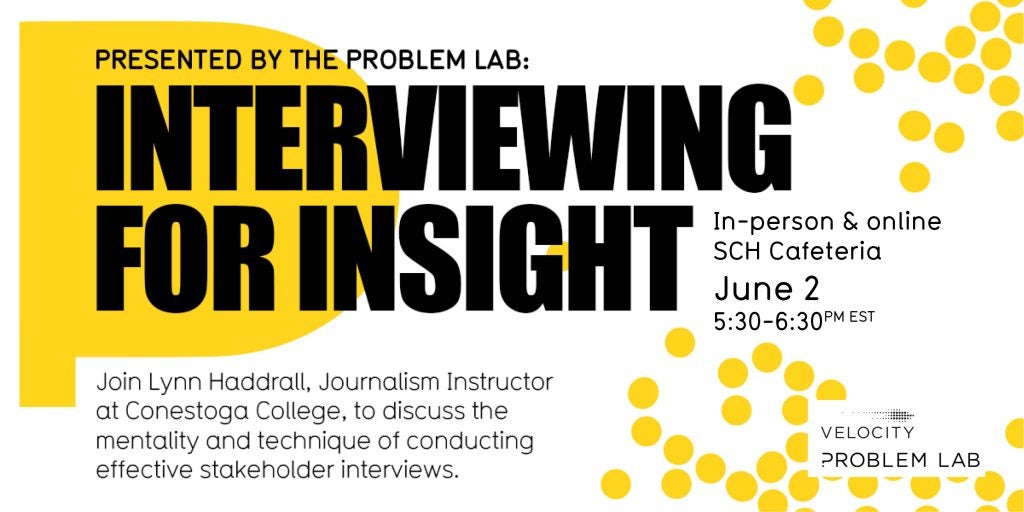
"Stakeholder/customer interviews, when done properly, can help you learn insights that you would not otherwise know," says a note from Concept. "Join Interviewing For Insight on Thursday, June 2 at 5:30 p.m. with Lynn Haddrall, Journalism Instructor at Conestoga College, to discuss the mentality and technique of conducting effective stakeholder interviews."
Learn more and register on the Concept website.
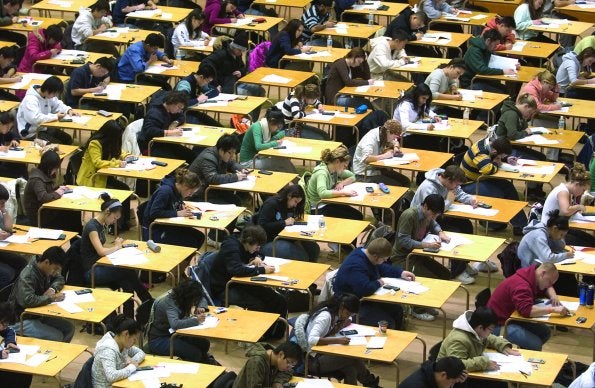
The spring Final Examination Period will run from Friday, July 29 to Saturday, August 13 (no exams are scheduled between July 30 and August 1). Exams may occur in person within classrooms or the Physical Activities Complex (PAC). View the spring 2022 final exam schedule (PDF) and learn more on the Registrar's Office website.
Link of the day
When and Where to get support
Students can visit the Student Success Office online for supports including academic development, international student resources, immigration consulting, leadership development, exchange and study abroad, and opportunities to get involved.
Instructors looking for targeted support for developing online components for blended learning courses, transitioning remote to fully online courses, revising current online courses, and more please visit Agile Development | Centre for Extended Learning | University of Waterloo (uwaterloo.ca).
Instructors can visit the Keep Learning website to get support on adapting their teaching and learning plans for an online environment.
Course templates are available within your course in LEARN to help you build and edit your content and assignment pages quickly.
The following workshops, webinars, and events are offered by the KL team (CTE, CEL, ITMS, LIB):
-
Scholarship of Teaching and Learning (SoTL) Methods – self-directed, continuous self-enrollment course in LEARN.
-
Independent Blended Course Design (iBlend) - self-directed, continuous self-enrollment course in LEARN.
-
Copyright Overview for Waterloo Instructors and Staff - self-directed, continuous self-enrollment course in LEARN.
-
Independent Remote Course Design Essentials (iReCoDE)- self-directed, continuous self-enrollment course in LEARN.
-
Supporting Student Mental Health (for Instructors) – self-directed, continuous self-enrollment course in LEARN.
-
NEW - PebblePad Users Group (CTE7526), Thursday, June 2, 1:00 p.m. to 2:30 p.m.
-
NEW - SoTL Stories, June 15, 1:00 p.m. to 2:00 p.m.
Supports are available for employees returning to campus. Visit IST’s Hybrid Work and Technology guidelines and workplace protocols to assist with the transition.
The Writing and Communication Centre has virtual services and programs to help undergrads, grad students, postdocs and faculty members with academic writing.
- Meet with writing advisors in one-to-one appointments to brainstorm, draft, revise, and polish. No time for an appointment? Try email tutoring for undergrads.
- Beat isolation and make writing progress at weekly Virtual Writing Cafés for grad students and faculty or PJ-Friendly Writing Groups for Undergrads.
- Take an online workshop or apply to our popular Dissertation Boot Camp program.
- Faculty can request custom in-class workshops for their courses, or the WCC can facilitate any existing workshops for student groups.
- Course-integrated support available. Attention faculty and instructors: The application form for Writing and Communication Centre course-integrated support is now available online. We offer five unique support streams for your courses including synchronous and asynchronous workshops and monitored discussion boards.
Co-op students can get help finding a job and find supports to successfully work remotely, develop new skills, access wellness and career information, and contact a co-op or career advisor.
The Centre for Career Action (CCA) has services and programs to support undergrads, grad students, postdocs, alumni, and employees in figuring out what they value, what they’re good at, and how to access meaningful work, co-op, volunteer, or graduate/professional school opportunities. Questions about CCA's services? Live chat, call 519-888-4047, or stop by our front desk in the Tatham Centre 8:30 a.m. to 4:30 p.m., Monday to Friday.
Drop-in to Warrior Virtual Study Halls on Wednesdays from 5:30 p.m. to 7:00 p.m. Come together in this virtual space to set goals and work independently or in groups each week.
Renison's English Language Institute continues to offer virtual events and workshops to help students practice their English language skills.
If you feel overwhelmed or anxious and need to talk to somebody, please contact the University’s Campus Wellness services, either Health Services or Counselling Services. You can also contact the University's Centre for Mental Health Research and Treatment. Good2Talk is a post-secondary student helpline available to all students.
The Library is open with expanded hours for access to book stacks, drop-in individual study space, bookable group study rooms, drop-in access to computers and printers, book pick-up services and IST Help Desk support. Librarian consultations, Special Collections & Archives and the Geospatial Centre are available by appointment. Full details on current services and hours are available on the Library’s COVID-19 Update webpage.
The Faculty Association of the University of Waterloo (FAUW) continues to advocate for its members. Check out the FAUW blog for more information.
The University of Waterloo Staff Association (UWSA) continues to advocate for its members. Check out the UWSA blog for more information.
The Sexual Violence Prevention and Response Office (SVPRO) supports all members of the University of Waterloo campus community who have experienced, or been impacted, by sexual violence. This includes all students, staff, faculty and visitors on the main campus, the satellite campuses, and at the affiliated and federated Waterloo Institutes and Colleges. For support, email: svpro@uwaterloo.ca or visit the SVPRO website.
The Office of Indigenous Relations is a central hub that provides guidance, support, and resources to all Indigenous and non-Indigenous campus community members and oversees the University's Indigenization strategy.
The Waterloo Indigenous Student Centre, based at St. Paul’s University College, provides support and resources for Indigenous students, and educational outreach programs for the broader community, including lectures, and events.
WUSA supports for students:
Peer support - MATES, Glow Centre, RAISE, Women’s Centre - Visit https://wusa.ca/services/wusa-peer-support to book an appointment either in person or online for the Fall term.
Food Support Service food hampers are currently available from the Turnkey Desk 24/7 in the Student Life Centre. Drop off locations are also open again in SLC, DC, DP, SCH and all residences.
Co-op Connection all available online. Check https://wusa.ca for more details.
Centre for Academic Policy Support - CAPS is here to assist Waterloo undergraduates throughout their experience in navigating academic policy in the instances of filing petitions, grievances and appeals. Please contact them at caps@wusa.ca. More information is available.
WUSA Student Legal Protection Program - Seeking legal counsel can be intimidating, especially if it’s your first time facing a legal issue. The legal assistance helpline provides quick access to legal advice in any area of law, including criminal. Just call 1-833-202-4571.
Empower Me is a confidential mental health and wellness service that connects students with qualified counsellors 24/7. They can be reached at 1-833-628-5589.
GSA-UW supports for graduate students:
The Graduate Student Association (GSA-UW) supports students’ academic and social experience and promotes their well-being.
Advising and Support - The GSA advises graduate students experiencing challenges and can help with navigating university policies & filing a grievance, appeal, or petition.
Mental Health covered by the Health Plan - The GSA Health Plan now has an 80 per cent coverage rate (up to $800/year) for Mental Health Practitioners. Your plan includes coverage for psychologists, registered social workers, psychotherapists, and clinical counselors.
Dental Care - The GSA Dental Plan covers 60 to 70 per cent of your dental costs and by visiting dental professionals who are members of the Studentcare Networks, you can receive an additional 20 to 30 per cent coverage.
Student Legal Protection Program - Your GSA fees give you access to unlimited legal advice, accessible via a toll-free helpline: +1-833-202-4571. This advice covers topics including housing disputes, employment disputes, and disputes with an academic institution.
The Graduate House: Open Monday to Tuesday 11:30 a.m. to 7:00 p.m. and Wednesday to Friday 11:30 a.m. to 9:00 p.m. We’re open to all students, faculty, staff, and community members. The Graduate House is a community space run by the GSA-UW. We’re adding new items to the menu. Graduate students who paid their fees can get discounts and free coffee.
When and Where (but mostly when)
Warriors vs. Laurier Blood Donation Battle. Join our “Waterloo Warriors” team on the Blood.ca website or app. #ItsInYouToGive
Equity and inclusion in industry sponsored contract research and commercialization consultations for researchers, Monday, May 9 to Friday, June 3. Sign up for an interview timeslot.
National AccessAbility Week 2022, Sunday, May 29 to Saturday, June 4.
UW Staff Board Foundations workshop, Wednesday, June 1, 4:00 p.m., Microsoft Teams, Register for Session 002.
Interviewing for Insight, Thursday, June 2, 5:30 p.m.
Alumni Weekend, Saturday, June 4, 9:00 a.m. to 9:00 p.m.
Paint Brubacher House!, Brubacher House Artist-in-Residence Workshops with Yulia Balobanova, Saturday, June 4, 3:30 p.m., BRH (Brubacher House, North Campus UW).
TD Walter Bean Visiting Professorship: faculty & graduate student meetings, Monday, June 6 to Friday, June 10.
“Moving Forward by Slowing Down: Considering Diverse Perspectives on Drug Decriminalization and Legalization,” in person or online for the Waterloo community (online for the general public). Tuesday, June 7, 1:00 p.m. to 3:30 p.m. Keynote: Dr. João Goulão, Ministry of Health, Portugal. Followed by a panel moderated by Globe and Mail journalist André Picard.
Master of Taxation Virtual Information Session, Wednesday, June 8, 4:00 p.m.
CPI Talk: Digital Disinformation and Democracy, Wednesday, June 8, 6:30 p.m., Zoom.
Building Respectful Research Relationships with Indigenous Communities Webinar, Indigenous History Month 2022, Thursday, June 9, 12:00 p.m.